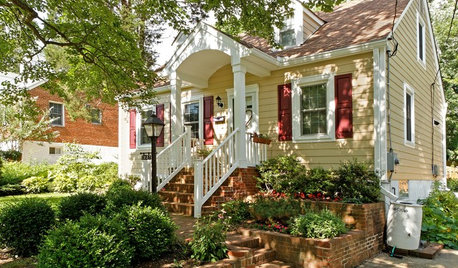What are the steps in a FSBO transaction?
caulk_king
15 years ago
Related Stories

MOST POPULAROrganizing? Don’t Forget the Essential First Step
Simplify the process of getting your home in order by taking it one step at a time. Here’s how to get on the right path
Full Story
ORGANIZING8 Steps to a Winning Filing System
When you streamline your paperwork and digital files for easy use and maintenance, it's an organizational triumph
Full Story
BEFORE AND AFTERSHouzz Tour: A Georgia Foreclosure Gets a Major Overhaul
Gutting and redesigning turn a mishmash 1925 home into a unified haven with better flow
Full Story
SELLING YOUR HOUSEHelp for Selling Your Home Faster — and Maybe for More
Prep your home properly before you put it on the market. Learn what tasks are worth the money and the best pros for the jobs
Full Story
MOVINGThe All-in-One-Place Guide to Selling Your Home and Moving
Stay organized with this advice on what to do when you change homes
Full Story
SELLING YOUR HOUSE15 Questions to Ask When Interviewing a Real Estate Agent
Here’s what you should find out before selecting an agent to sell your home
Full Story
ORGANIZINGWant to Streamline Your Life? Get a System
Reduce stress and free up more time for the things that really matter by establishing specific procedures for everyday tasks
Full Story
DECORATING GUIDESStaging vs. Decorating: What's the Difference?
Unlike decorating, staging your home isn't about personal style — it's about creating ambiance and appeal for buyers
Full Story
SELLING YOUR HOUSESell Your Home Fast: 21 Staging Tips
Successful staging is key to selling your home quickly and at the best price. From cleaning to styling, these tips can help
Full Story
MOVINGHow to Avoid Paying Too Much for a House
Use the power of comps to gauge a home’s affordability and submit the right bid
Full StoryMore Discussions








lucy
dabunch
Related Professionals
Palos Verdes Estates Architects & Building Designers · Broadview Heights General Contractors · Buena Park General Contractors · Erie General Contractors · Greenville General Contractors · Natchitoches General Contractors · Rancho Santa Margarita General Contractors · Riverdale General Contractors · Troutdale General Contractors · Troutdale General Contractors · Waipahu General Contractors · Bellflower Home Stagers · Brooklyn Park Home Stagers · Bloomingdale Interior Designers & Decorators · Little Egg Harbor Twp Interior Designers & DecoratorsLinda
terezosa / terriks
caulk_kingOriginal Author
muddypond